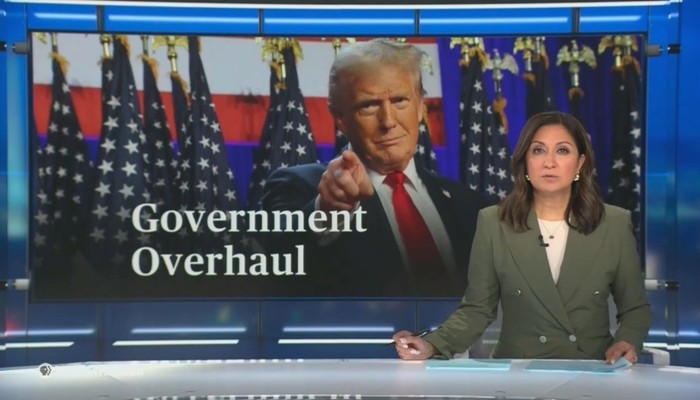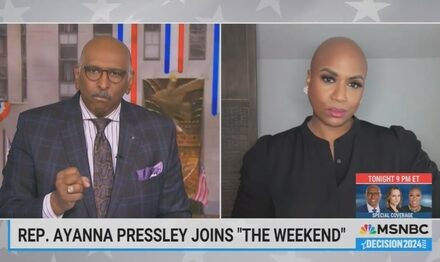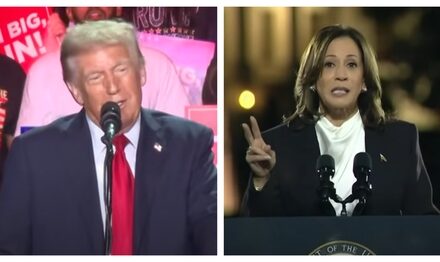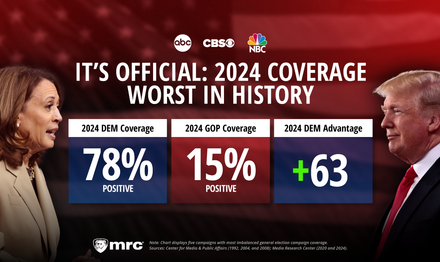We support our Publishers and Content Creators. You can view this story on their website by CLICKING HERE.

As President-elect Donald Trump moves to shake up the federal bureaucracy, White House correspondent Laura Barron-Lopez pushed a new Red Scare on Tuesday’s edition of the PBS NewsHour.
But first came a series of clips introduced by anchor Amna Nawaz of several disgruntled bureaucrats and union members working (for now) in the federal government. Surprise! They’re all opposed to Trump’s plans. One example will suffice:
As if government employees are more vulnerable to job loss than private-sector ones!
Nawaz set up White House correspondent Barron-Lopez.
Barron-Lopez explained that President Biden “tried to protect federal workers” but that Trump can reverse it, then ran a clip of a public policy professor opposed to Trump’s move, making the segment even more one-sided (she said she had also talked to Mike Howell, head of the Oversight Project at the conservative Heritage Foundation, but that was off-camera).
Barron-Lopez pounced on a suspiciously leading question from Nawaz (“…are there any historic parallels we can look to here?”) to offer up a new McCarthyism for government workers — as if federal jobs should be untouchable.
This segment was brought to you in part by American Cruise Lines.
PBS NewsHour
11/19/24
7:20:56 p.m. (ET)
Amna Nawaz: President-elect Donald Trump has vowed to make wide-scale changes to the federal work force, cutting jobs, replacing career civil servants with political appointees and relocating government offices. Laura Barron-Lopez has more in just a moment. But, first, let’s hear from federal government employees across the U.S.
Colin Kramer, Government Employee: My name is Colin Kramer. I’m a chemist with the EPA. I’m involved with AFGE Local 704 as a union member.
Jesus Soriano, Government Employee: My name is Jesus Soriano. I’m a scientist and a program director at the National Science Foundation. I am also president of AFGE Local 343.
Michael Knowles, Government Employee: My name is Michael Knowles. I’m an asylum officer with U.S. Citizenship and Immigration Services. And I’m the executive vice president of the AFGE National Citizenship and Immigration Services Council 119.
Sheria Smith, Government Employee: I’m Sheria Smith, a Dallas-based civil rights attorney at the U.S. Department of Education, where I also serve as the union president for my almost 3,000 colleagues in this agency nationwide. I did read after his election some statements about eliminating the agency. And I think it’s shortsighted. Certainly, for — perhaps he has not had to interact with our agency because his own children, he’s been able to afford to educate them privately. But that is not the situation for most Americans.
Jesus Soriano: When our future boss, the president, is passing the message that we do not belong here, that many of us will lose our jobs, that our families will suffer, that we may be forcibly relocated to other area, we care. We suffer. Employees are fearful, scared for their jobs, for their families, and many of them are already considered leaving.
Michael Knowles: It would hold people more accountable to carry out the policies of a new administration, whether or not those policies were lawful. It’s really more of a — what we would say would be more of a loyalty indicator, rather than an efficiency indicator.
Colin Kramer: I worry about taking projects, data, and conclusions made in good faith, made through the scientific process, rigorously checked, peer-reviewed, and gone through all of these different avenues, I worry about those taken and being used for illegitimate purposes, illegitimate decisions in ways that they, frankly, have no business being used to justify.
Jesus Soriano: The federal government is going to lose hundreds of years of institutional memory and expertise. That is actually a national security issue, although we are not a national security agency.
We’re talking about, if there’s no science, there’s no progress. If there’s no progress, we won’t be able to stand up to strategic adversaries.
Sheria Smith: They would be evaluating our work not based on how well we regulate servicers or how well we protect American citizens from predatory schools or how well we enforce laws that protect our nation’s children, but how observant we are to whatever political whims might be at play in the White House.
Michael Knowles: We’re very concerned about attitudes by various politicians that somehow civil servants are an obstacle or a deep state of resistors or woke employees. Or we have even seen language of far left, open-border advocates. And I would say there’s nothing farther from the truth.
Amna Nawaz: And our White House correspondent, Laura Barron-Lopez, joins me now. Laura, good to see you.
Laura Barron-Lopez: Good to be here.
Amna Nawaz: So we heard some fear, some confusion in the voices of those federal employees about the extent of president-elect Trump’s plans to overhaul government agencies. What do we know about what he’s planning to do?
Laura Barron-Lopez: President-elect Donald Trump made clear in his campaign, but also he’s made clear in his Cabinet picks, that he wants loyalty across the board with little to no resistance. That is his top goal.
And so, to achieve that, sources close to the transition say that he is expected to issue an executive order known as Schedule F as soon as he takes office. Now, this is an executive order that he issued during his first term. It didn’t take effect. But what is Schedule F, Amna?
Schedule F would allow the president to change the job classification of nonpartisan career federal workers to political appointees. So, in essence, it makes it much easier for Donald Trump to fire anyone he deems disloyal and to replace them with loyalists.
Now, initially, those who wrote Schedule F believed that it could affect some 50,000 federal workers across agencies. But that number is likely a minimum. And experts that we spoke to say that it could affect many more people.
Amna Nawaz: So what else do we know about how far reaching this could be? And are there any guardrails in place to protect against that?
Laura Barron-Lopez: President Joe Biden attempted to put in some guardrails. He tried to protect federal workers with a regulation.
But Donald Trump, once he becomes president, could very well reverse that regulation. And experts that we spoke to said that he could implement Schedule F, this executive order, within four to six months after taking office.
Now, I spoke to Don Moynihan. He’s a public policy professor at the University of Michigan. And he said that Donald Trump and his allies are already specifically identifying certain targets.
Don Moynihan, University of Michigan: They’re engaging in a strategy of naming and shaming of federal employees, of intimidation, of career civil servants who are not really in the public eye. For some of them, they’re creating Web sites funded by The Heritage Foundation that lists these individuals, puts them online, and is telling the Trump administration, these are the people that you should fire.
It is a fairly disturbing pattern, which I think will only make it harder to recruit and retain talented people who want to work for the federal government.
Laura Barron-Lopez: Now my producer, Shrai Popat, and I spoke to Mike Howell. He is the head of what’s called the Oversight Project at The Heritage Foundation, which Don just spoke about. And Mike Howell said that they have filed some 65,000 federal — or Freedom of Information requests across government agencies to obtain e-mails between federal workers and documents about federal workers.
Now, Mike Howell with Heritage says that they’re not working directly with Donald Trump’s team, but their goal is to help identify bureaucrats that they deem partisan. And their top priority is to target people across Homeland Security and Justice Departments, as well as the FBI, who they think are sympathetic to things like Black Lives Matter protesters, who have worked on diversity or inclusion projects and who worked on cases against the January 6 rioters.
They’re also focused on civil servants who just simply are carrying out President Biden’s policy priorities. And so they’re hoping to flag for the incoming Trump administration anyone they call untrustworthy, despite this being the very nature of civil servants’ jobs, Amna, which is to carry out any president’s agenda regardless of their political affiliation.
Amna Nawaz: You know, in some of the voices there, we also heard some fear about wholesale gutting of federal agencies and departments there. Mr. Trump himself has said he’d like to abolish the Education Department. How feasible is any of that?
Laura Barron-Lopez: Well, let’s just lay out the numbers real quick.
Currently, there are more than two million civil servants, not political appointees. That number’s been pretty consistent throughout the 1960s. Despite that, Vivek Ramaswamy, who’s going to co-lead this government efficiency agency, has said that they want to — quote — “delete outright” some government agencies.
Now, the experts that we talked to said that that’s not exactly feasible, that that would be a lot harder, and that, historically, agencies are created, reorganized and eliminated by Congress. So Donald Trump and his staff may very well run into headwinds from Congress.
Amna Nawaz: What’s the larger impact all of this could have? And are there any historic parallels we can look to here?
Laura Barron-Lopez: Don Moynihan of the University of Michigan compared this to the 1950s McCarthy era, where civil servants had to be vetted for loyalty under this guise of rooting out communists, essentially.
And Moynihan said that sometimes that meant that they would target who they — quote — “deemed as deviants,” like LGBTQ people. But Don Moynihan added that filling the civil service with cronies, as well as loyalists, with friends, defeats the very purpose that the civil service was founded on.
Don Moynihan: If you look at the history of America, the introduction of the civil service system was a response to the corruption that took place with the spoils system that preceded it.
And it was called a spoils system because once a president or a governor or mayor took over the government, they used public resources, not always in the public good, but to reward their supporters.
Laura Barron-Lopez: As Moynihan said there, Amna, this could potentially lead to more corruption across the federal government.
Amna Nawaz: Our White House correspondent Laura Barron-Lopez. Laura, thank you.
Laura Barron-Lopez: Thank you.

 Conservative
Conservative  Search
Search Trending
Trending Current News
Current News 





